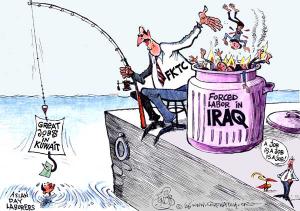Kuwait Company’s Secret Contract & Low-Wage Labor
Baghdad Embassy Bonanza
David Phinney, journalist and broadcaster based in Washington, DC
February 12th, 2006
A controversial Kuwait-based construction firm accused of exploiting employees and coercing low-paid laborers to work in war-town Iraq is now building the new $592-million U.S. embassy in Baghdad. Once completed, the compound will likely be the biggest, most fortified diplomatic compound in the world. Some 900 workers live and work for First Kuwaiti General Trading & Contracting (FKTC) on the construction site of the massive project. Undoubtedly, they have been largely pulled from ranks of low-paid laborers flooding into Iraq from Asia's poorest countries to work under U.S. military and reconstruction projects.
Some 900 workers live and work for First Kuwaiti General Trading & Contracting (FKTC) on the construction site of the massive project. Undoubtedly, they have been largely pulled from ranks of low-paid laborers flooding into Iraq from Asia's poorest countries to work under U.S. military and reconstruction projects.
Meanwhile, their boss, Wadih al-Absi jets back and forth to the United States, dreaming of magazine covers celebrating his rise to a global player in large-scale engineering and construction. ...
the plight of some of these migrants at military camps around Iraq have openly complained that the Asians endure abysmal working conditions, live in cramped housing, eat poor food, and lack satisfactory medical care and safety gear. ...
Today, the firm has racked up hundreds of millions of dollars in U.S. contracts in Iraq, pushing the company well past the $1 billion mark. With 7,000 employees in Iraq, the company claims to be holding $800 million in construction and supply contracts directly with the Army for military camps, plus more than $300 million under Halliburton 's multibillion dollar contract to perform military logistics for the occupation forces in Iraq.
It's the kind of success that allows al-Absi to enjoy finely tailored suits with French cuff shirts, send his children to American universities and enjoy the fruits of being a newly-minted millionaire. "I love America," he says freely. ...
The New Embassy
Indeed, the massive $592-million project may be the most lasting monument to the U.S. occupation in the war-torn nation. Located on a on a 104-acre site on the Tigris river where U.S. and coalition authorities are headquartered, the high-tech palatial compound is envisioned as a totally self-sustaining cluster of 21 buildings reinforced to 2.5 times usual standards. Some walls as said to be 15 feet thick or more. Scheduled for completion by June 2007, the installation is touted as not only the largest, but the most secure diplomatic embassy in the world.
The 1,000 or more U.S. government officials calling the new compound home will have access to a gym, swimming pool, barber and beauty shops, a food court and a commissary. In addition to the main embassy buildings, there will be a large-scale Maine barracks, a school, locker rooms, a warehouse, a vehicle maintenance garage, and six apartment buildings with a total of 619 one-bedroom units. Water, electricity and sewage treatment plants will all be independent from Baghdad's city utilities. The total site will be two-thirds the area of the National Mall in Washington, DC. Unlike most of Iraq's reconstruction, the embassy is "on time and on budget," according to a December report to U.S. Senate Foreign Affairs Committee which calls the progress an "impressive" feat given that construction is taking place in a country besieged by war.
Unlike most of Iraq's reconstruction, the embassy is "on time and on budget," according to a December report to U.S. Senate Foreign Affairs Committee which calls the progress an "impressive" feat given that construction is taking place in a country besieged by war.
"Most major construction projects undertaken in Iraq since 2003 have not met these standards," writes Patrick Garvey, a member of the Senate Foreign Relations staff who traveled to Baghdad in November 2005. ... al-Absi asked to keep the embassy contract a secret until the first floors were built. The dangers of an attack are just too serious, he said. Even his personal residence had been bombed in the past. "I am all for transparency, but this is Iraq," he said. ...
Al-Absi, who speaks excellent English occasionally peppered with bluntness of a construction worker, denies the allegations of ill-treatment and trafficking.
"It's bullshit," he said, after emailing electronic documents apparently signed by Autencio and others agreeing to work in Iraq. "Total bullshit."
But stories of mistreatment recently prompted the U.S. State Department to join forces with the Defense Department into possible labor trafficking by Middle East firms doing business in Iraq.
"Our people are investigating the issues," said State Department spokesman Justin Higgins after U.S. Ambassador John Miller, head of the Office to Monitor and Combat Trafficking of Persons, left for the Middle East in late January. ...
Secretive Contract
The contracts for building the largest, most-strongly fortified embassy in the world is a tale of fits and starts. From the Bush Administration's initial request for more than a billion dollars in emergency funding for the project to the selection of an inexperienced Kuwaiti firm to build it -- to even the small oversight effort is also a tale of secrecy.
Although White House had signaled Congress in early 2004 that it was planning a permanent embassy in Baghdad, it wasn't until spring 2005 that the Bush Administration formally pushed the funding request veiled as an emergency measure. The original proposal for $1.3 billion was almost three times the price of the new embassy in China. ...
source
Sunday, February 12, 2006
besieged war, embassy built
Posted by audacious at 12.2.06
Subscribe to:
Post Comments
(Atom)










































0 comments:
Post a Comment